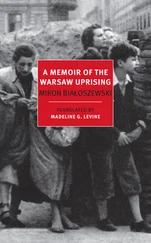Stefa must have crawled out of bed and used all that was left of her strength to drag our armchair to the window. I know that because two parallel scratches from the chair legs marked the wooden floor. The window had been shut tight to keep out the frigid wind. My niece had been unable to lift a spoon to feed herself, but she must have somehow managed to throw it wide open.
Later, when I questioned Ewa, she swore to me that the door was locked the last time she came to check on Stefa. As always, she’d let herself in with her spare key. There was no sign of anyone having been there to help her commit suicide. Stefa had been asleep in bed.
‘Or she looked asleep,’ I noted.
‘Or that,’ Ewa agreed.
Why did my niece put on her slippers before jumping? True, her feet were always cold of late, but she must have known she’d feel no discomfort soon enough. Maybe she didn’t want the person who found her to see the open sores between her toes. I’d known nothing about that small corner of her misery. She’d hidden quite a lot, as it turns out.
In any case, she put on her red and gold Moroccan slippers, climbed up on the chair and eased herself down on the window ledge. Her brittle arms must have been trembling under the strain. One after the other, she swung her legs over the rim until she was sitting on it and facing out – a complex manoeuvre. I know that because I tried it myself, and I’d swear in any court that it required a dexterity and strength that were beyond her.
Ziv was on break and sitting outside the bakery, reading a chess newsletter that had been printed in the ghetto; it had an article on Szmul Rzeszewski, one of his heroes.
Did Stefa hear him call out to her not to move, that she was in danger of falling?
‘I’ll be right up!’ he shouted. ‘Wait for me!’
What did she think as she pushed and swivelled herself closer to the edge? Perhaps that gravity was a blessing.
I hope she imagined she was about to see Adam again, but maybe it would have been best if she was thinking nothing at all.
Ziv told me later that she didn’t seem to hear him or even notice he was there.
‘As soon as she hit the ground, she was dead.’ That’s what Professor Engal told me when I returned to the courtyard, which was what he had heard from Ziv. Maybe they wanted to spare me more anguish. Still, thirty feet is a long way for someone to fall, and maybe he was right.
Ziv rushed to her but couldn’t find a pulse. He dashed into the bakery for help. Ewa and several others tried to revive my niece, but it was too late.
Stefa’s slippers had fallen off. Ziv retrieved them while waiting for the Jewish police to come, then sat down in the corner of the courtyard, his head in his hands. He didn’t move from there all afternoon and slept there that night. I brought him a blanket, and he let me cover him with it, but he refused to speak to me or come inside.
I’d learned by then that going on strike against the world’s injustice was a common ghetto strategy. Not that it ever changed anything.
I’d never previously considered that he’d been in love with Stefa. After all, she was seventeen years his senior. Still, if I’d have been paying attention, I’d have understood that the rose blossom and fresh eggs he gave her on the evening of our first Sabbath banquet represented his opening gambit in what was probably a ten-move strategy. And maybe age differences are unimportant to those who live with queens and rooks dancing through their dreams.
My niece’s corpse waited all night for the body collectors. They only came at ten the next morning, explaining that disease and starvation were taking a hundred residents a day and they couldn’t cope. By then, I’d dragged her into the hallway of our building; it had started drizzling. I’d wanted to hire some boys from the street to carry Stefa up to her apartment, but Professor Engal told me that the collectors would resent having to walk up the stairs – and might even refuse.
Stefa’s miracle…
At 3 a.m. on the morning after her death, standing at the window in my room, I looked down at her in the courtyard, and I noticed Ziv jump up and chase after a vague, darting shape. Fearing it was a feral cat or worse, I threw on my coat, hurried downstairs and sat with my niece. Ziv was back tucked into his corner by then, but now he was whimpering to himself. A little later, I looked up to the window of my bedroom, and in the hazy moonlight it seemed the entranceway to a fairytale world, out of which magic had spilled into this place only a little while before. My wonder at how Stefa had found the strength to open her window, climb out on to the sill and jump now seemed to contain everything I’d ever failed to grasp throughout my life – even how men and women could believe in God. And that’s when I realized that miracles do indeed occur, though – unfortunately – they aren’t always the glorious affirmations of transcendence that we have all been led to believe.
I’ll have to be more wary on my excursions. Early this afternoon, Heniek, while you were working at your factory, I crossed the bridge to the Praga district to make sure my old friend Jaśmin was still alive. Unfortunately, the entrance to her apartment house was locked. I waited outside, watching the passers-by, until, finally, after a couple of hours, she appeared at her window, gazing at the powdering of snow that had begun to fall. I stayed there a long time after she went back to whatever she was doing, grateful that Izzy and I hadn’t caused her death. But on the way home, feeling my strength renewed and wanting a small adventure, I decided to go to the Little Ghetto to see what wonders were gracing the shop windows of Sienna Street. A mistake.
I never made it there; I found a crowd swarming out in front of All Saints Church, and at its centre was a burly butcher hacking away at the emaciated, mud-brown carcass of an old mare. Hot blood kept spurting on to his grimacing face. I could tell from the way the poor beast’s ribcage stood out that she’d been an underfed, work-damned tram horse. A poisonous-looking steam was rising from the wormy ravine of her open belly.
The ghetto devours itself and will never die , I thought.
I’d never seen a horse without a head and backed away slowly.
‘You’ve grown silent again,’ Heniek tells me.
‘I thought I was telling you about a dead horse,’ I reply.
‘No, you haven’t said a word in twenty minutes.’
Heniek says I can go an hour or more without speaking, even though I can hear my voice clearly and am sure I’m talking to him. He says my silence scares him, because my edges begin to darken, as though I’m being engulfed by a greedy shadow.
Though he tries to wake me from my trances by calling my name, I show no sign of hearing him.
It is our fourth day together by my count. My seventh, according to him. I do not know how so many days disappear.
After Stefa’s husband Krzysztof died of tuberculosis in 1936, my niece would shut herself inside her bedroom and sob. Adam was five then. The little boy once told me that the scrape and click of her turning her key in the lock made him feel like crying out for help, but whose name would he have called? Hearing his mother’s weeping, he’d plead with her to let him in while squatting on his heels by her door. He’d scratch like a cat and jiggle the door handle but nothing could convince her to open up.
After confessing these details, he added, ‘But it’s not so bad. I don’t even cry any more. Though I keep scratching. Or else Mama might forget I’m there.’
Amazingly, he didn’t show any resentment; he was proud of his ability to cope on his own.
Читать дальше












